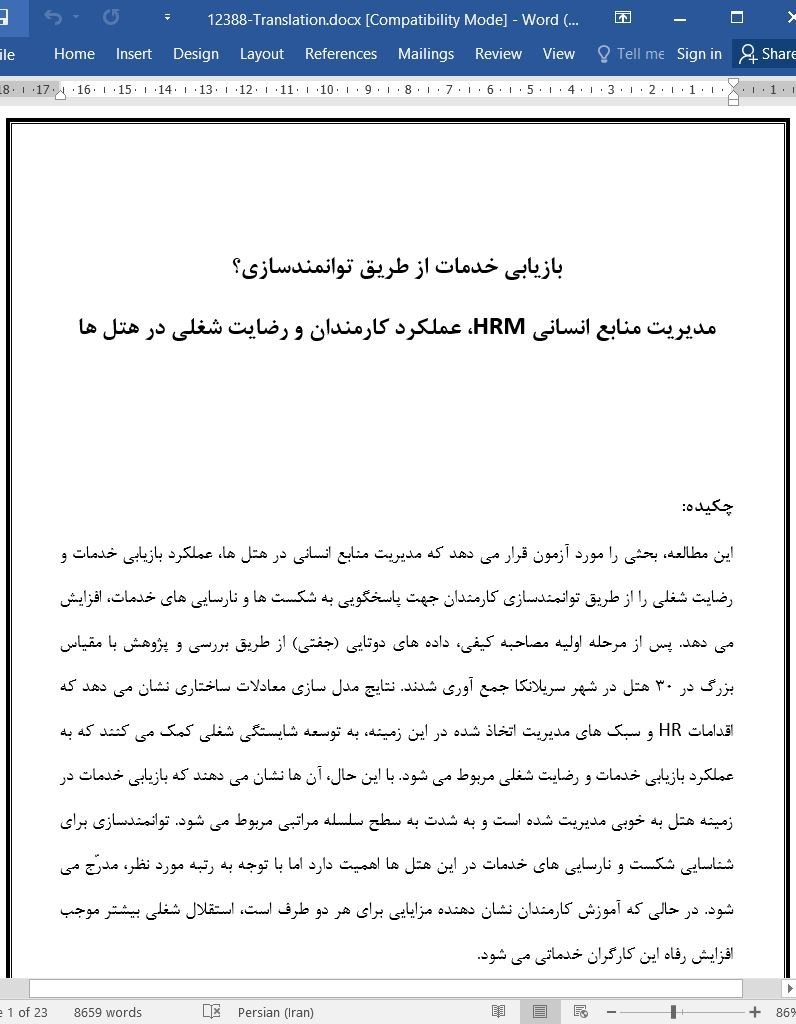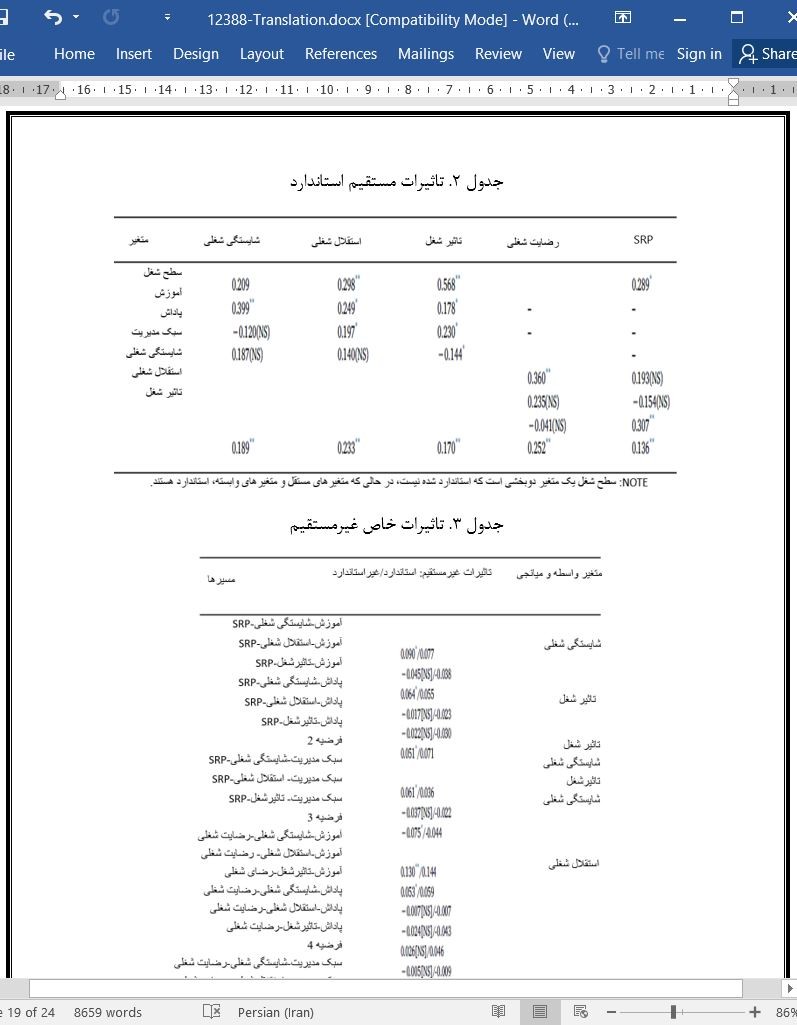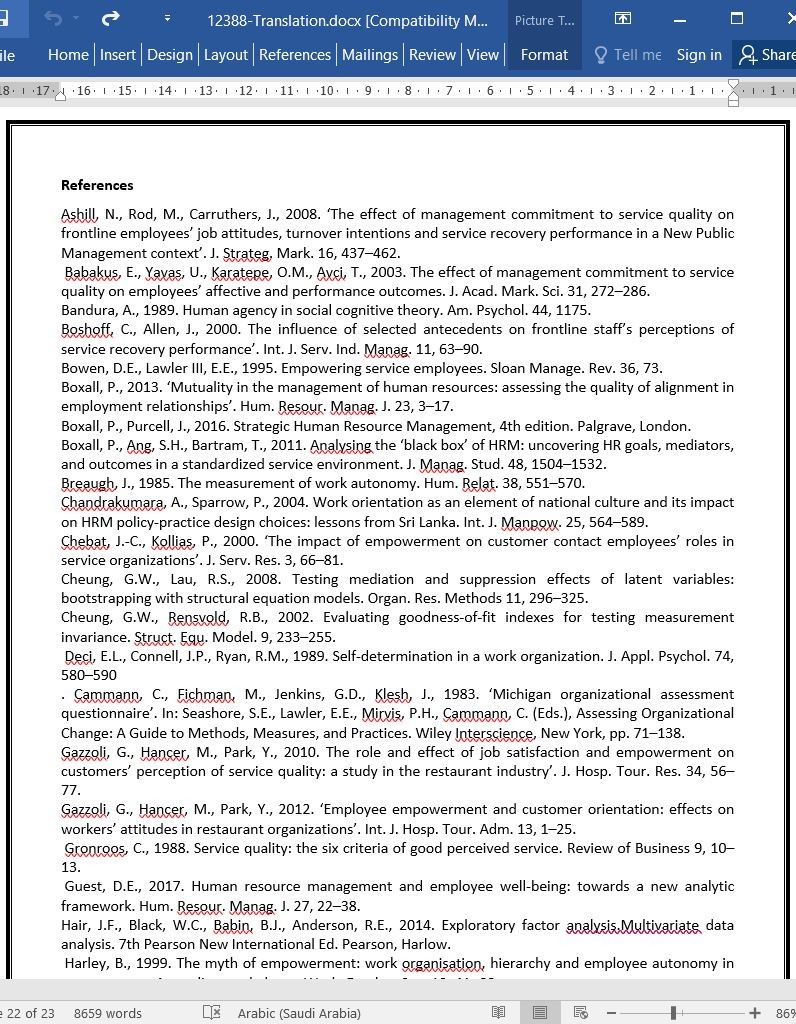
بازیابی خدمات از طریق توانمندسازی؟ مدیریت منابع انسانی HRM، عملکرد کارمندان و رضایت شغلی
چکیده
این مطالعه، بحثی را مورد آزمون قرار می دهد که مدیریت منابع انسانی در هتل ها، عملکرد بازیابی خدمات و رضایت شغلی را از طریق توانمندسازی کارمندان جهت پاسخگویی به شکست ها و نارسایی های خدمات، افزایش می دهد. پس از مرحله اولیه مصاحبه کیفی، داده های دوتایی (جفتی) از طریق بررسی و پژوهش با مقیاس بزرگ در 30 هتل در شهر سریلانکا جمع آوری شدند. نتایج مدل سازی معادلات ساختاری نشان می دهد که اقدامات HR و سبک های مدیریت اتخاذ شده در این زمینه، به توسعه شایستگی شغلی کمک می کنند که به عملکرد بازیابی خدمات و رضایت شغلی مربوط می شود. با این حال، آن ها نشان می دهند که بازیابی خدمات در زمینه هتل به خوبی مدیریت شده است و به شدت به سطح سلسله مراتبی مربوط می شود. توانمندسازی برای شناسایی شکست و نارسایی های خدمات در این هتل ها اهمیت دارد اما با توجه به رتبه مورد نظر، مدرّج می شود. در حالی که آموزش کارمندان نشان دهنده مزایایی برای هر دو طرف است، استقلال شغلی بیشتر موجب افزایش رفاه این کارگران خدماتی می شود.
1. مقدمه
این امر مشخص شده است که خدمات با جوانب نامحسوسی مواجه می شود از جمله این که کارکنان خدمات چگونه می توانند با مشتریان برخورد کنند و هم چنان در کیفیت مورد نظر، اختلاف و انحراف وجود دارد (زیتامل 1985). این واقعیت منجر به علاقه و توجه زیاد به دلایل"شکست و نارسایی های خدمات" و نحوه تعمیر خسارات و آسیب های شرکت ها از طریق استراتژی های"بازیابی خدمات" می شود (گرونروس 1988). اگرچه شکست و نارسایی های خدمات موجب نارضایتی مشتریان می شود، بحث این جا است که بازیابی موثر خدمات می تواند این نارضایتی را شناسایی کرده و روابط مشتری را افزایش دهد (ساجتوس 2010). طبق نظر میشل در سال 2001، شکست و نارسایی خدمات، اجتناب ناپذیر است اما در مورد مشتریان ناراضی، این گونه نیست. بحث رایج در ادبیات بازاریابی خدمات این است که مدیریت باید توانمندسازی کارگران خدماتی را افزایش دهد تا بتوانند به شکست ها و نارسایی های خدمات پاسخ دهند (آشیل 2008 باباکوس 2003).
7. نتیجه گیری:
این مطالعه با استفاده از داده های کارمندان و مدیران در هتل های سریلانکا نشان داد که اقدامات HR و سبک های مدیریتی اتخاذ شده در این زمینه به توسعه شایستگی شغلی کمک می کنند به رضایت شغلی و عملکرد بازیابی خدمات مربوط می شود. نتایج از مدل ساده HRM که منجر به توانمندسازی و عملکرد خدمات در هتل های مورد نظر می شود، حمایت نمی کنند. در حالی که آموزش کارمندان می تواند حس بیشتری از استقلال شغلی را ترغیب نماید، مورد دوم به عملکرد بازیابی خدمات مربوط نمی شود. از نظر استقلال شغلی و تاثیر شغل، سرپرستان توانمندی بیشتری نسبت به کارگران خدماتی و مدیران دارند. در حالی که همه کارمندان برای گوش دادن و عذرخواهی از مشتریان ناراضی آموزش می بینند، کارگران غیرسرپرستی باید مسائل جدی تری را گزارش دهند. توانمندسازی برای شناسایی شکست و نارسایی خدماتی در این هتل ها اهمیت دارد. بر مبنای نمونه مورد نظر، هر پست و موقعیت نظری که بیان کند مدیریت به سطح بالایی از توانمندی کارمندان برای شناسایی شکست ها و نارسایی های خدمات نیاز دارد، بسیار واجد شرایط و شایسته است. در نهایت، در داده ها مشاهده می کنیم که تقابل در روابط اشتغال را می توان افزایش داد. کارگران خدماتی در این هتل ها احتمالا از استقلال بیشتر در نحوه پاسخگویی به شکست های خدماتی، استقبال می کنند (اگر مدیران ان ها موجب تشویق و ترغیب ان ها شوند).
Abstract
This study tests the argument that human resource management in hotels enhances service-recovery performance and job satisfaction through empowering front-line employees to respond to service failures. After an initial phase of qualitative interviewing, dyadic data were gathered through a large-scale survey in thirty hotels in Sri Lanka. The results of structural equation modelling show that the HR practices and management styles adopted in this context help to develop job competence, which is then related to service-recovery performance and job satisfaction. However, they show that service recovery is carefully stage-managed and ‘staircased’ in this hotel context with empowerment strongly related to hierarchical level. Empowerment to address service failures is important in these hotels but it is deliberately graduated according to rank. While employee training shows benefits for both parties, greater job autonomy would enhance the well-being of these service workers.
1. Introduction
It is well known that service encounters contain intangible aspects, including how customers are treated by service staff, contributing to variation in quality (e.g., Zeithaml et al., 1985). This reality has led to a longstanding interest in the causes of ‘service failure’ and how firms might repair the damage through ‘service recovery’ strategies (e.g., Gronroos, 1988). Even though service failure generates dissatisfied customers, the argument is that effective service recovery can address this dissatisfaction and potentially enhance customer relationships (e.g., Sajtos et al., 2010). According to Michel (2001, p. 20), ‘service failures are inevitable, but dissatisfied customers are not’. A common argument in the services marketing literature is that management should foster the empowerment of front-line service workers so that they are enabled and incentivised to respond to service failures (e.g., Ashill et al., 2008; Babakus et al., 2003).
7. Conclusions
Using dyadic data from employees and managers in Sri Lankan hotels, this study showed that the HR practices and management styles adopted in this context helped to develop job competence, which was then related to job satisfaction and service-recovery performance. The results do not support a simple, unqualified model of HRM leading to empowerment and thence to service performance in our sample of hotels. While employee training may encourage a greater sense of job autonomy, the latter is not connected to service-recovery performance. In terms of job autonomy and, more strongly, job impact, supervisors were significantly more empowered than service workers and managers rated them as making a much greater contribution to service recovery. While all employees are carefully trained to listen and apologise to disgruntled customers, non-supervisory workers must escalate the more serious problems they encounter. Empowerment to address service failure is important in these hotels but it is carefully stage-managed and ‘staircased’ or graduated according to rank. Based on our sample, any theoretical position that implies that hotel management needs a high level of empowerment of front-line employees to address service failures needs to be more carefully qualified. Finally, we see in the data where mutuality in employment relationships might be enhanced. Service workers in these hotels would likely appreciate greater autonomy in how to respond to service failures if their managers would encourage it.
چکیده
1. مقدمه
2. بازیابی خدمات، توانمندسازی کارمندان و HRM در هتلداری و مهمان نوازی
3. فرضیات
4. طرح پژوهش و روش ها
4.1 زمینه پژوهش: هتل ها در سریلانکا
4.2 مطالعه نمونه، نمونه و پرسشنامه ها
4.3 معیارها، اعتبارسنجی مقیاس و آمار جمعیتی
4.3.1 عملکرد بازیابی خدمات (SRP)
4.3.2 رضایت شغلی
4.3.3 توانمندسازی
4.3.4 اقدامات HR و سبک های مدیریتی
4.3.5 متغیر کنترل
4.3.6 اختلاف و انحراف روش مشترک
4.3.7 دموگرافیک و آمار جمعیتی
5. نتایج
5.1 تحلیل SEM
5.2 آزمون فرضیات
6. بحث
6.1 نقش های نظری
6.2 پیامدهای عملی
6.3 محدودیت ها
7. نتیجه گیری
منابع
ABSTRACT
1. Introduction
2. Service recovery, employee empowerment and HRM in hospitality
3. Hypotheses
4. Research design and methods
4.1. Research context: hotels in Sri Lanka
4.2. Pilot study, sample and questionnaires
4.3. Measures, scale validation and demographics
4.3.1. Service-recovery performance (SRP)
4.3.2. Job satisfaction
4.3.3. Empowerment
4.3.4. HR practices and managerial styles
4.3.5. Control variable
4.3.6. Common method variance
4.3.7. Demographics
5. Results
5.1. SEM analysis
5.2. Hypothesis testing
6. Discussion
6.1. Theoretical contributions
6.2. Practical implications
6.3. Limitations
7. Conclusions
References
- اصل مقاله انگلیسی با فرمت ورد (word) با قابلیت ویرایش
- ترجمه فارسی مقاله با فرمت ورد (word) با قابلیت ویرایش، بدون آرم سایت ای ترجمه
- ترجمه فارسی مقاله با فرمت pdf، بدون آرم سایت ای ترجمه



